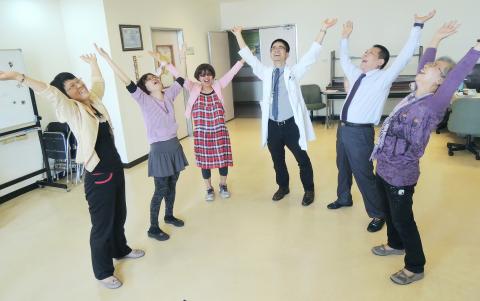More than 70 percent of the 30 cancer patients in a laughter yoga program reported sleeping better, experiencing less pain and feeling less depressed after taking some classes, Taichung Hospital said recently.
Laughter yoga teaches people to laugh hard, which increases endorphin release, helps improve their emotional well-being, enhances their immune system, and reduces inflammation and stress hormones, said Liao Chih-Ying (廖志穎), director of the hospital’s radiation oncology department.
Liao, who introduced laughter yoga from the US to the hospital in October last year, said most cancer patients experience different degrees of post-traumatic stress disorder, with about 40 percent suffering depression, anxiety, insomnia or chronic stress when they experience pain or are undergoing treatment.

Photo: Tsai Shu-yuan, Taipei Times
The increase in stress hormones, adrenaline and inflammation-
related genes also weaken their immune system, allowing cancer cells to become more aggressive and enhancing the risks of cancer metastasis, he said.
Laughter yoga leads to the release of endorphins and fake laughter can gradually become real laughter through constant practice, he said.
The endorphins can help relieve stress, improve their mood and immune system, and even prevent the recurrence and spread of cancer, he added.
The hospital invited yoga teacher Lai Ching-ju (賴晴如) to give a one-hour class to cancer patients every week, and after two months, about 70 percent of the participants reported improvements in their problems with sleeping, pain, fatigue, anxiety and depression.
A 48-year-old woman surnamed Hsieh (謝), who owns a cram school and teaches English and essay writing, said she used to work more than 10 hours a day, but was seldom sick, so she found it hard to believe after she was diagnosed with breast cancer last year.
She underwent surgery and chemotherapy, and suffered from depression and bipolar disorder, losing about 10kg in six months because of the side effects of the treatment. She often locked herself in a room crying, throwing things around, slamming her body against the wall and collected sleeping pills as she contemplated suicide.
When the hospital’s volunteers invited her to attend the laughter yoga class, she could not laugh at all at first. However, by starting first with fake laughs, playing games and practicing meditation, she was able to laugh from the heart during the second class and gradually laughed harder, regained her appetite and continues practicing at home.
She imagined her body completely recovered, read jokes on the Internet and has become truly happy, always greeting people with a smile, Hsieh said.
Laughter yoga has helped improved her relationship with her family and encouraged her to travel, Hsieh said, adding that she has learned to be grateful to the sickness that has turned her life around.
A restaurant owner surnamed Wang (王), who was diagnosed with Stage 3 gastric cancer two years ago, had to have two-thirds of his stomach removed, and went through electrotherapy and chemotherapy. Wang said he thought he was “almost about to die” because he could not eat anything.
He said he was always in low spirits, but later thought he might as well try laughter yoga as a last resort.
“I found out that I wanted to laugh as much as I could, to laugh away the cancer cells and that I would rather die laughing than crying,” Wang said.
“Now, I feel happy all the time, doing volunteer work, Chinese calligraphy, practicing taichi and living an enriched life,” he added.

An essay competition jointly organized by a local writing society and a publisher affiliated with the Chinese Communist Party (CCP) might have contravened the Act Governing Relations Between the People of the Taiwan Area and the Mainland Area (臺灣地區與大陸地區人民關係條例), the Mainland Affairs Council (MAC) said on Thursday. “In this case, the partner organization is clearly an agency under the CCP’s Fujian Provincial Committee,” MAC Deputy Minister and spokesperson Liang Wen-chieh (梁文傑) said at a news briefing in Taipei. “It also involves bringing Taiwanese students to China with all-expenses-paid arrangements to attend award ceremonies and camps,” Liang said. Those two “characteristics” are typically sufficient

A magnitude 5.9 earthquake that struck about 33km off the coast of Hualien City was the "main shock" in a series of quakes in the area, with aftershocks expected over the next three days, the Central Weather Administration (CWA) said yesterday. Prior to the magnitude 5.9 quake shaking most of Taiwan at 6:53pm yesterday, six other earthquakes stronger than a magnitude of 4, starting with a magnitude 5.5 quake at 6:09pm, occurred in the area. CWA Seismological Center Director Wu Chien-fu (吳健富) confirmed that the quakes were all part of the same series and that the magnitude 5.5 temblor was

The brilliant blue waters, thick foliage and bucolic atmosphere on this seemingly idyllic archipelago deep in the Pacific Ocean belie the key role it now plays in a titanic geopolitical struggle. Palau is again on the front line as China, and the US and its allies prepare their forces in an intensifying contest for control over the Asia-Pacific region. The democratic nation of just 17,000 people hosts US-controlled airstrips and soon-to-be-completed radar installations that the US military describes as “critical” to monitoring vast swathes of water and airspace. It is also a key piece of the second island chain, a string of

The Central Weather Administration has issued a heat alert for southeastern Taiwan, warning of temperatures as high as 36°C today, while alerting some coastal areas of strong winds later in the day. Kaohsiung’s Neimen District (內門) and Pingtung County’s Neipu Township (內埔) are under an orange heat alert, which warns of temperatures as high as 36°C for three consecutive days, the CWA said, citing southwest winds. The heat would also extend to Tainan’s Nansi (楠西) and Yujing (玉井) districts, as well as Pingtung’s Gaoshu (高樹), Yanpu (鹽埔) and Majia (瑪家) townships, it said, forecasting highs of up to 36°C in those areas